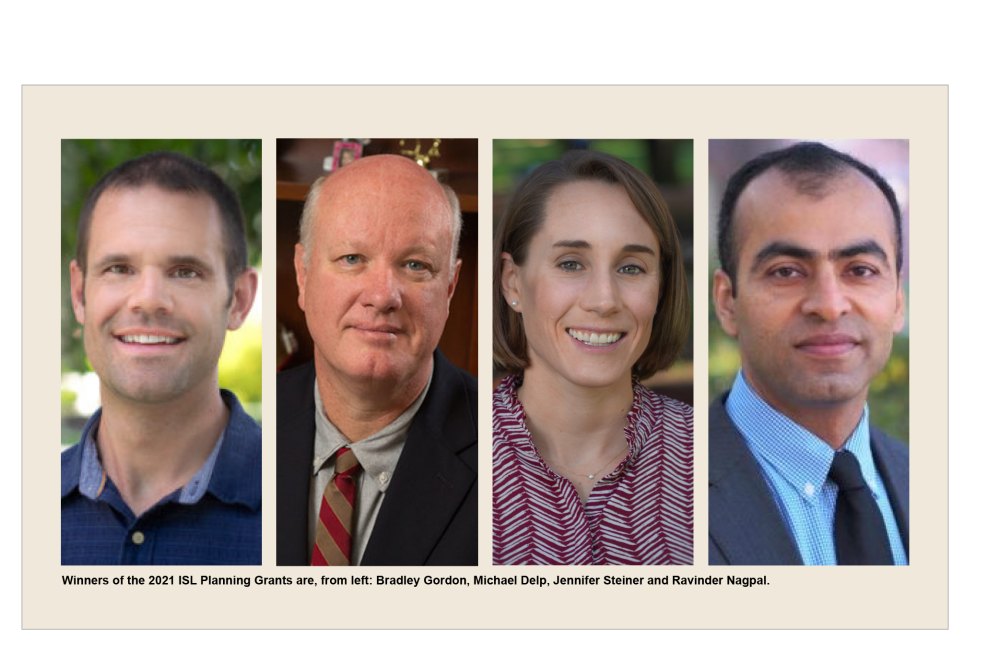The Institute for Successful Longevity has awarded its 2021 ISL Planning Grants to Bradley Gordon and Michael Delp, for their project to establish the contribution of specific genes to the loss of skeletal muscle in response to disuse, and to Jennifer Steiner and Ravinder Nagpal, for their study of the effects of alcohol use and associated gut microbiome decline on aging-related loss of skeletal muscle mass and strength.
Gordon, Steiner and Nagpal are all assistant professors in the Department of Nutrition, Food & Exercise Sciences in the College of Human Sciences. Delp is dean of the college.
Each ISL Planning Grant provides a $15,500 award in support of research in a new direction or provides continuing support of existing research with the goal of improving the opportunity for successful longevity.
“We are pleased to support these scientists as they conduct research on the loss of muscle mass and strength in older adults,” said Neil Charness, Director of the Institute for Successful Longevity. “This is an important area of concern, and new research is needed to explore possible interventions that could arrest or mitigate these losses.”
Gordon’s research focuses on understanding how stimuli such as nutrients, hormones, and physical activity regulate changes in skeletal muscle mass and muscle function in diseased and non-diseased conditions. On this project, Gordon continues his research on molecular factors in age-related muscle loss.
Delp’s research is primarily focused on understanding the effects of physical activity on the cardiovascular system.
“The loss of skeletal muscle with age impairs physical function, increases the risk of disease and death, and imparts a heavy financial burden on the health-care system,” Gordon, lead investigator on the project, wrote in the request for funding. “Though decreased physical activity (referred to as disuse) promotes the loss of skeletal muscle in all age groups, the loss of skeletal muscle is accelerated in the elderly. This accelerated loss of skeletal muscle occurs within five days of disuse. This is a profound problem for the elderly because they may never recover the lost muscle when they return to normal activity.”
This is a critical problem, according to Gordon, yet there are no therapies to prevent the accelerated loss of aged muscle in response to disuse. “A primary reason,” he wrote, “is that the molecular factors causing the greater loss of aged muscle are unknown.”
In this study, Gordon will seek to establish the contribution of two novel genes his research had identified earlier in relation to aged skeletal muscle loss due to disuse. “This will define the potential for targeting these novel genes therapeutically to preserve skeletal muscle and maintain health in elderly individuals that are subjected to disuse,” Gordon wrote.
Steiner’s research interests include the role of nutrition and exercise in the prevention and treatment of disease as well as the promotion of optimal health and performance, with a focus on the impact of alcohol and different dietary/exercise treatments on the maintenance of skeletal muscle health.
Nagpal’s research focuses on understanding the host-associated gut microbiome and the dynamics of the diet-gut-brain interface at the extremes of aging and in aging-associated metabolic and cognitive health.
In their project, Steiner and Nagpal will look at the loss of skeletal muscle mass and strength and negative effects of alcohol use on the gut microbiome, which is made up of many bacterial species that can influence other body tissues via release of metabolites and regulation of nutrient absorption. Older adults are drinking more alcohol, Steiner, the lead investigator, said in the funding request, but “no well-controlled, interventional studies have been performed to determine whether alcohol enhances sarcopenia [muscle loss with aging] and gut dysbiosis [microbiome decline], or whether gut dysbiosis may contribute to alcohol-enhanced sarcopenia.”
Steiner and Nagpal will investigate whether alcohol also exacerbates aging-related changes to the gut microbiome and whether changes in the gut microbiome are associated with alcohol-induced exacerbation of sarcopenia.













